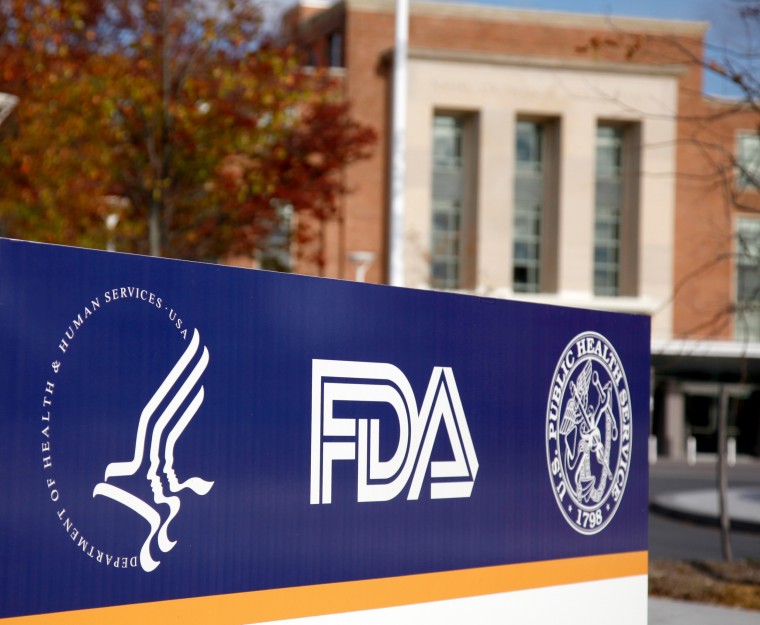President Donald Trump says he wants the Food and Drug Administration to speed up drug approvals and lower drug prices, but former FDA officials say it really couldn’t get much faster.
And consumer advocates said Trump’s “preposterous promises” would be dangerous and would hurt both consumers and the drug industry.

Trump met the CEOs of several big pharmaceutical companies Tuesday and promised to cut FDA regulation, making it easier to get drugs approved. Trump also signed an executive order mandating that agencies cut two regulations for every new regulation, without making it clear how they could do so.
"We’re going to streamline the FDA," Trump said.
But Dr. David Kessler, who headed FDA in the 1990s, said the agency has already streamlined its drug approval process.
“Every administration for the last 40 years has talked about speeding up drug approval,” Kessler told NBC News.
"If you get sick …chances are if you live in the United States, you are going to have access to a drug first."
“The reality is that we’re the fastest in the world. If you get sick …chances are if you live in the United States, you are going to have access to a drug first. It’s going to be approved first in the United States.”
Susan Wood, a former assistant FDA commissioner and now associate director of health policy at George Washington University, agreed.
“There is no need to speed things up any more. We are already bringing things to market faster than Europe,” Wood told NBC News. “That is a bogus issue on speed.”
The FDA now has four separate pathways for approving drugs more quickly:
- Fast track
- Breakthrough therapy
- Accelerated approval
- Priority review
It takes an average of 10 months for a new drug to get approved, according to FDA data.
Related: Trump Tells Drugmakers to Make Stuff in the U.S.
In 2008, only about 40 percent of new drug applications got approved, but the odds grew to 60 percent by 2012, according to PriceWaterhouseCoopers. That’s because the agency is working more closely with drug companies to help them get applications and studies in place that will make it easier to get through the process.
“The fact is, we have spent the last three decades speeding up the drug approval process,” said Kessler.
In fact, drugs get approved so quickly now that consumer protection groups are complaining. Groups howled last year when the FDA approved a controversial muscular dystrophy drug over the objections of its own advisers.
“We’re going to streamline the FDA. We have a fantastic person that I think I we’ll be naming fairly soon. He's going to streamline the FDA and you're going to get your products either approved or not approved but it's going to be a quick process. It’s not going to take 15 years,” Trump told the drug company CEOs.
The 15-year figure is often cited by the industry as the time it takes to develop a drug from start to finish —not the FDA approval time, which is usually less than a year.
“President Donald Trump’s preposterous promise to pharmaceutical company CEOs to slash U.S. Food and Drug Administration (FDA) regulations by 75 to 80 percent would, if fulfilled, fundamentally destroy the ability of the agency to protect patients and consumers from unsafe or ineffective medications and medical devices, hazardous foods and dietary supplements, and dangerous tobacco products, among other things,” said Dr. Michael Carome, director of Public Citizen’s Health Research Group.
“The end result would be countless preventable deaths, injuries and illnesses across the U.S.,” Carome added.
“Trump’s horrifying proposal reflects utter ignorance about the FDA’s essential role in protecting public health and once again demonstrates his commitment to placing corporate profits above protecting the safety of the American people."
“Trump’s horrifying proposal reflects utter ignorance about the FDA’s essential role in protecting public health."
Kessler said the pharmaceutical industry benefits from FDA oversight that keeps a level playing field. Pharmaceutical Research and Manufacturers of America (PhRMA), the drug company lobbying group, agrees.
“The United States leads the world in the introduction of new medicines thanks in part to the human drug review program by the U.S. Food and Drug Administration (FDA),” it says on its website.
Having FDA oversight allows companies to say their products will do just what they say they’ll do on the label, Kessler said.
“That justifies to some extent drug companies being able to charge what they want to charge,” Kessler said.
'Reform existing laws'
Trump also said he wanted to bring down drug prices, and said one way to do that would be to bring drug manufacturing back to the United States. However, drug companies now make many products overseas, and get most of their raw materials abroad, because it’s cheaper to do it that way.
“I don’t know why he said that it would be cheaper if we made them in the U.S.,” Wood said.
PhRMA CEO Stephen UBL even hinted that the industry would like to see some drug prices go up more.
“The current system needs to evolve to enable the private sector to lead the move to a value-driven health care system,” Ubl said in a statement after the Trump meeting.
Related: Americans Spent Even More on Drugs Last Year
“To do this, we need to reform existing laws and regulations that are currently preventing private companies from negotiating better deals and paying for medicines based on the value they provide to patients and our health care system.”
That’s a kind of code for saying companies should be able to charge more for drugs that save more lives.
Americans spend more on drugs than people in any other developed nation.
Most other rich countries have government-run health care systems and negotiate for lower drug prices. That would mean allowing Medicare to negotiate drug prices, but drug companies overwhelmingly oppose that, and Trump has sent mixed messages about whether he'd support letting the federal government negotiate what it pays for drugs.
